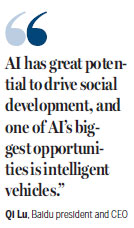Baidu unlocks platform for self-driving cars
Baidu Inc's announcement that it will share its technology for autonomous or driver-less cars may help lead to the quicker development of critical technology that will be needed for the vehicles and could ultimately drive business to the Chinese internet search company.
Baidu said Wednesday in China that its Apollo project will make its software, hardware and data services for self-driving cars available to others, especially carmakers. It will first open its autonomous driving technology on a limited basis in July and then share its technology for cars in simple urban road conditions at the end of the year. It will gradually introduce fully autonomous driving capabilities on highways and urban roads by 2020.
Baidu President and COO Qi Lu said, "AI (artificial intelligence) has great potential to drive social development, and one of AI's biggest opportunities is intelligent vehicles."
Eric P. Dennis of the Center for Automotive Research in Ann Arbor, Michigan, said this isn't an unprecedented move.
"Comma.AI and Udacity already have open source driving automation software. It's not clear to me if Baidu intends to make their software publically available, or just available through industry partnerships. Comma.AI and Udacity have actually published their software, so anyone can experiment with it," he wrote in an email.
Baidu's decision to unlock its technology may be similar to what Google did with its Android operating system for smartphones several years ago. By giving unlimited access to Android, this increased its use and eventually produced higher sales of mobile apps and services for Google.

Autonomous cars will require very complex software to respond to the many driving situations the vehicles will encounter. Dennis said everyone is testing the cars on public roads because it is the best way to develop software that can function properly in the real world.
"Vehicles being tested on-road today are focused as much on training the software as testing it. If you open source your software and other people run it, you can gather more real-world data that developers need to teach the cars how to drive. Such methods of 'machine learning' are essential to develop highly automated vehicles. Generally, the more miles you accumulate, the faster you can develop self-driving capability," said Dennis.
Jeremy Carlson, principal automotive analyst from IHS Markit said that opening such a rich repository should benefit both Baidu and the industry.
"Baidu gains strong positioning early in partners' development cycles for a technology of long-term strategic relevance to many industries. Part of the challenge today in advancing software and artificial intelligence in autonomous driving is simply data, time, and miles driven, and having more projects working on the same platform can provide helpful scale," Carlson said in a statement.
Baidu has invested heavily in the research and development of autonomous driving technology since 2015. In December 2015, Baidu conducted successful road tests for its fully autonomous cars on highways and roads in Beijing.
It received an autonomous vehicle testing permit in California in September, and conducted open trial operations of its autonomous car fleet in November at the World Internet Conference in Wuzhen.
Fan Feifei in Beijing contributed to this story.
paulwelitzkin@chinadailyusa.com
(China Daily USA 04/20/2017 page2)








